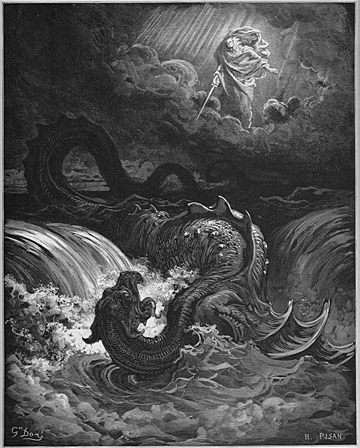Aịzaya 27
1 Nʼụbọchị ahụ, Onyenwe anyị ga-eji mma agha ya iwe ya, dị ukwuu dịkwa ezigbo ike, taa agwọ ahụ na-akpụ akpụ bụ Leviatan ahụhụ. Leviatan bụ agwọ mgbakọ ahụ; ọ ga-egbukwa nnukwu anụ ọjọọ ahụ nke bi na mmiri.
At that time, Yahweh will punish Leviathan, the swift-moving monster/dragon, that coiling serpent that lives in the sea. Yahweh will kill it with his sharp, huge, and powerful sword.
2 Nʼụbọchị ahụ, abụ a ga-adị nʼọnụ ha, abụ ha ga-abụ banyere ubi vaịnị nke na-amị ezi mkpụrụ.
At that time, [Yahweh will say], “You [Israeli people, who are like] [MET] a fruitful vineyard, must sing!
3 “Mụ onwe m bụ Onyenwe anyị na-elekọta ya, ana m agba ya mmiri ụbọchị niile, na-eche ya nche ehihie na abalị. Ka onye ọbụla ghara iji ihe ọjọọ leta ya.
I will [protect you] [like a farmer] [MET] waters his crops carefully [in order that they will grow well]. I will guard you day and night, in order that no one harms you.
4 Adịghị m ewekwa iwe. Ọ bụrụ na ọ bụ naanị ogwu na uke na-echere m aka mgba, aga m ebili buso ha agha, aga m esurekwa ha ọkụ.
I am no [longer] angry [with my people]; [if any of your enemies try to injure you like briers and thorns injure people] [MET], I will attack them [in battles]; I will get rid of them completely,
5 Ma ọ bụghị otu a, ka ha bịakwute m maka nchekwa, ha bịa ka mụ na ha mee udo. E, ha bịa ka mụ na ha mee udo.”
unless they request me to protect them; I strongly invite them to make peace with me [DOU]!”
6 Nʼụbọchị ndị na-abịa, Jekọb ga-agba mgbọrọgwụ. Izrel ga-agbawa okoko dịka osisi, maakwa ifuru, jirikwa mkpụrụ mejupụta ụwa niile.
There will be a time when the (descendants of Jacob/Israeli people) will [prosper like] a plant that has good roots; they will be like [MET] trees that bud and blossom and bear a lot of fruit; [what they do will bless] all the people in the world.
7 Onyenwe anyị atabeghị Izrel ahụhụ dịka o si taa ndị iro ya. O mebekwaghị ka e gbuo ndị ya dị ka e si gbuo ndị iro ha.
[But now I ask], has Yahweh punished us Israelis like he punished our enemies? Has he punished us as much as he punished them?
8 Onyenwe anyị tara ndị ya ahụhụ, mee ka a dọrọ ha nʼagha ma buru ha gaa mba ọzọ. Ọ bụ ifufe ọjọọ nke si nʼọwụwa anyanwụ ka o ji bupụ ha.
[No, he has not done that], [but] he punished us Israeli people and (exiled us/forced us to leave our country); we were taken away from our land as though [SIM] we were struck by a windstorm from the east.
9 Ọ bụ nʼụzọ dị otu a ka a ga-esi bupụ ikpe ọmụma dịrị Jekọb, nke a bụkwa iju eju nke mkpụrụ e ji wezuga mmehie ya: Mgbe ha gweriri nkume niile ha ji wuo ebe ịchụ aja arụsị ha dịka ntụ, mgbe ha wezugara ogidi arụsị Ashera, na ebe ịchụ aja ihe nsure ọkụ na-esi isi ụtọ niile.
Yahweh did that in order to punish us for our sins, and remove our guilt. As a result [of our being exiled], all the altars to other gods [in Israel] will be demolished, and we will be forgiven for the sins that we have committed. There will be no more poles for worshiping the goddess Asherah, or altars for burning incense to other gods; they will all be torn down.
10 Obodo ahụ e wusiri ike adakpọsịala. Ọ ghọọla ọzara nke ndị mmadụ na-ebighị nʼime ya. Ọ ghọọkwala ebe ụmụ ehi na-akpa nri, ebe ha na-amakpu na-ezu ike. Ha ga-atacha ahịhịa dị nʼalaka osisi.
The cities that have strong walls around them will be empty; like the desert, they will have no one living in them. The houses will be abandoned, and the streets will be full of weeds. Calves will eat grass there and lie down there; they will chew up all the leaves on the trees.
11 Mgbe alaka osisi ndị ahụ kpọnwụrụ daa, ụmụ nwanyị ga-abịa chịkọtaa ha were ha kwanye ọkụ. Nʼihi na ndị a bụ ndị na-enweghị nghọta. Ọ bụ nke a mere Onye kere ha adịghị emere ha ebere. Onye ahụ kpụrụ ha agakwaghị egosi ha obi ebere.
[The Israeli people are like] [MET] dry branches on a tree; women break them off and use them to make fires [under their cooking pots]. Our Israeli people do not have any sense; so Yahweh, who created them, will not act mercifully toward them or be kind to them.
12 Nʼụbọchị ahụ, Onyenwe anyị ga-ahọcha site nʼebe mmiri na-eru eru Yufretis ruo na Wadi nke Ijipt, ma gị, bụ Izrel ka a ga-achịkọta otu nʼotu.
[However], there will be a time when Yahweh will gather them together [again; he will separate them from the people who have conquered them, like people] separate wheat from chaff. He will bring them [back to Israel], one by one, from [the land between] the Euphrates River [in the northeast] and the brook at the border of Egypt [in the southwest].
13 Nʼụbọchị ahụ, opi ike ga-ada. Ndị ahụ na-ala nʼiyi nʼAsịrịa na ndị ahụ e mere ka ha gaa biri nʼIjipt dịka ndị mba ọzọ ga-abịa fee Onyenwe anyị ofufe nʼugwu nsọ ya dị na Jerusalem.
At that time, a trumpet will be blown very loudly. And those who were exiled to Assyria and Egypt and who almost died there will return to Jerusalem, to worship Yahweh on [Zion], his holy hill.





















